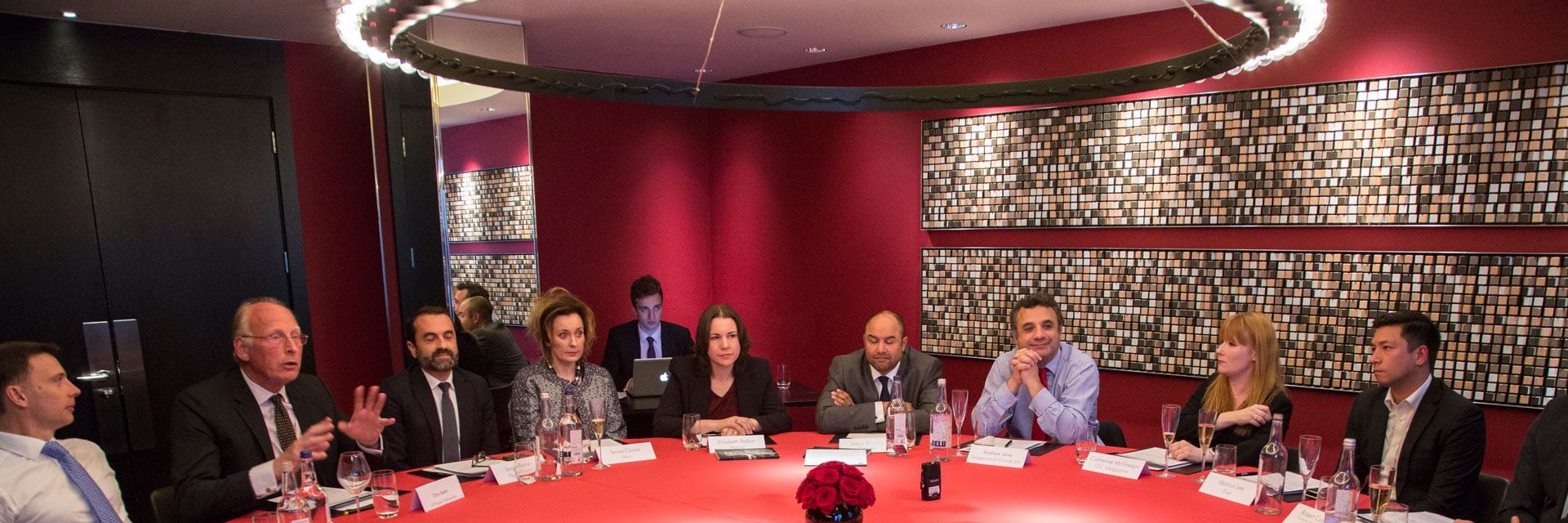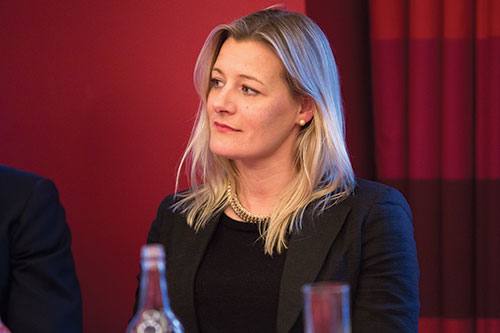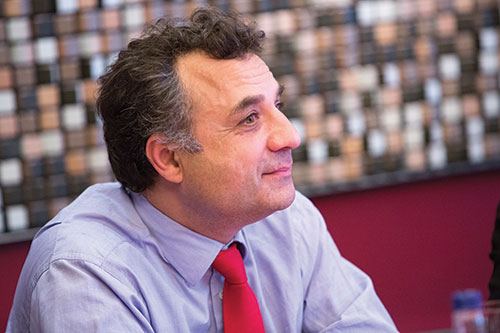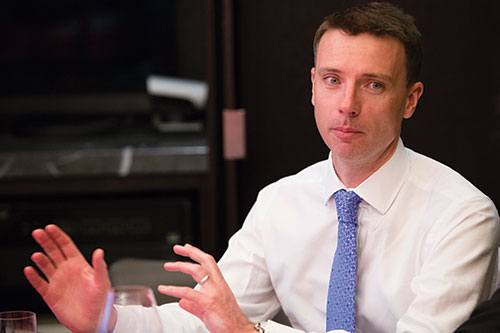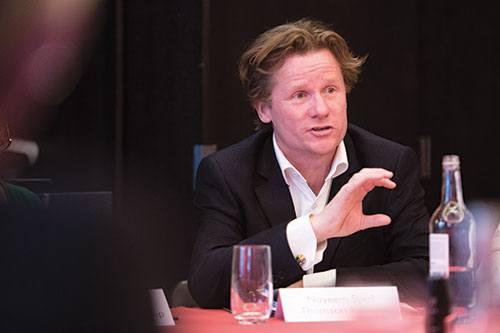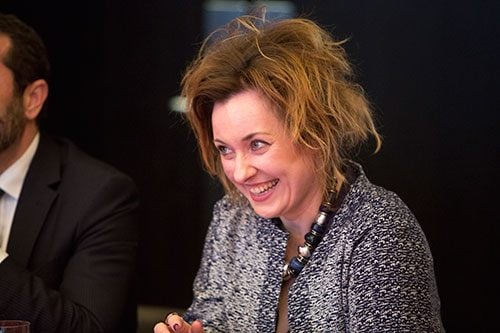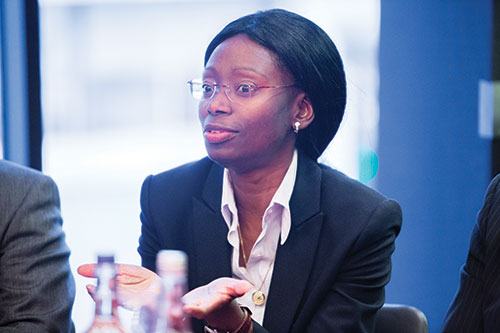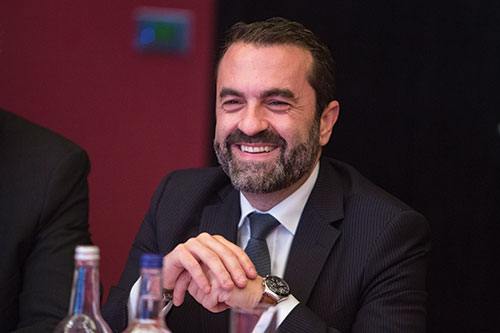
Building structure
Catherine McGregor: How does department structure impact on the motivation and incentives of your staff and direct reports?
Fergus Speight: It was raised this afternoon by one of my staff. There is myself, and six people who report to me. Only one person has raised the point that it would be good to get recognition of their specialisms by being titled head of the particular area that they focus on. At present, my reports have the title of ‘senior solicitor.’
Gareth Williams: We have had a flat structure during our private equity-owned era from the recession onwards, which worked then, but it is not working for me now. Now we are listed, we are bigger and have growth plans, so I am keen to have it much more siloed. We constructed our company so that there are B2B, B2C and financial services. My plan is to have a senior lawyer heading each of those divisions, who will report to me. From a motivational point of view, and for succession planning, I would like to have some senior lawyers beneath me.
Charlotte Heiss: I have found that my team are most motivated by their profile with the business and our peer groups rather than amongst themselves. If I can provide good diversity and quality of work, that seems to be more important than job titles. My team seem to really value having a seat at the table and being listened to when we are talking about strategic issues over and above whether there’s a ‘senior’ in their title.
Tom Cowling: I would agree with Charlotte. My team consists of seven, me included. What they seem to appreciate and what motivates them, apart from the complexity or novelty of work, is exposure to other stakeholders within the business – people who lead commercially and who are in a position to provide them with more work. My team all come from private practice, so I think they like this commercial exposure to directors and other senior staff within the business.
Fergus Speight: When I dug a little further as to why a particular person wanted a title, they said to me: ‘It is not necessarily for recognition in-house, but for the doors it opens outside when networking.’ It is easier for others to know what area they focus on, and as such it facilitates invites from particular industry or trade associations.
Charlotte Heiss: But there is a huge job title creep, is there not? You have to look at some US companies, where everybody is ‘senior vice president’ of something, and there are about 12 levels of management above them.
Robert Robinson: I have both continental lawyers and lawyers based here in the UK and have noticed a sharp dichotomy. The continental lawyers seem much more hung up on gradations of titles, much more so than the UK team who are more interested in whether they will get interesting, challenging work, with lots of client face-time. The contrast is very striking.
Stefan Albers-Brough: As soon as you go in-house, though, you lose the ‘partner’ title, you lose the ‘senior associate’ or whatever, and it becomes all PQE-based. So it is back to your enjoyment of the job, and as long as you are enjoying it, you are going to rack up those years in no time.
Robert Cummins: In addition to the networking opportunity, your colleague (who was asking you for a new title) may find it helps him to secure a bigger, better job elsewhere, if he has secured a bigger, better title in his current place. He can say, ‘I was made head of such and such’. In most of my peer group, I have sensed a desire to keep climbing.
Amanpreet Gill: I think having a clear structure helps retain staff. In the team I work in, I have had the opportunity to move up a couple of times. I think always having a next step to move to helps motivate a person, and it has been one of the reasons I have stayed in my current team as long as I have. I do agree that it is the variation of the work and people you work with that keeps you where you are, but it is also having that drive behind you to move on to the next level.
Nurturing talent
Charlotte Heiss: I think it depends what you’re looking for in your team. If you are recruiting the best and the brightest, you should acknowledge their ambitions and not necessarily want or expect them to stay longer than they continue to learn and develop for. I have no problem with the concept that my team are probably with me for, on average, three years. If I cannot offer them a promotion or bigger role then I see it as part of my role as their leader to help them get a job somewhere else. We should not be trying to keep them if they’re ready for a bigger role. I believe a fundamental part of our job is to develop people, equip them to move on, and then to bring in somebody else at the right time.
Chris Baker: I would absolutely agree with that. If people cannot develop, ultimately they become a problem for the business, because their capability does not grow. Development is key, and that builds flexibility for them and for the business.
Lesley Wan: I systematically set new non-legal challenges for each team member. I have created a lot of initiatives in my team, as well as within the organisation, ranging from chairing technical industry conferences, to working with gifted young children in school, and I encourage my entire team get involved in nearly everything that I do.
Motivational strategies
Catherine McGregor: What other opportunities are on offer aside from mentoring or CSR?
Charlotte Heiss: RSA runs talent development programmes designed for people who are earmarked as having potential, at different levels of seniority. People are put forward for the programmes by their managers, have the opportunity to meet similarly talented people across the globe and across disciplines, and present a project to the CEO at the end of it. It is really well received as a personal and career development piece. There is a big focus on individuals’ skillsets and people come away from these programmes with a much better understanding of what they need to do to make themselves better leaders for the future. That sort of thing is good for showing people that we are interested in them as a person.
Robert Robinson: We have a talent-spotting initiative internally. For a lot of people who go into an in-house gig, part of the attraction is the business. Giving the lawyers an opportunity to muck in on the business side, whether it is to manage a specific project with a legal component or something like a massive IT project, where they feel part of the team and deliver something that is useful to the business, is a great perk.
Gareth Williams: One of my successes over the last couple of years is that we were SRA-regulated to take on trainee lawyers. If you have not done it, you should really think seriously about doing it. Usually they are older than we all were when we did our training contracts, because they have actually worked in real life, and you can build a fantastic talent pool from them. It is like a two-year interview, because you do not have to take them on, and if you do like them, it all works really well. The enthusiasm that the trainees have had working in different parts of the company really makes me think, ‘why do I not start doing this with the qualified lawyers, and put them in different parts, and let them go native for six months, taking on board some different ideas?’
Marcus Lee: Our experience at Channel 5 has echoed that. We took on our first two trainees last year, and it was good for everyone. We held onto some very knowledgeable and able people who may have thought about heading out the door otherwise. At Channel 5 we have a relatively flat hierarchy and also I have direct reports to make it more manageable and organised. People really feel incentivised and motivated, and we have managed to hold onto our best people accordingly.
Business opportunities
Catherine McGregor: How receptive is the business to having new legal personnel put in front of them? Secondly, how easy is it to get recognition from the business for their skills?
Andrew Levy: The business often welcomes the lawyers as a free resource. It is not coming out of their budget and it is an extra pair of hands.
Chris Baker: I have a team of 23, of which 12 are solicitors. Every day they are in different places, sitting cheek by jowl with the business. That makes a big difference because they are working side by side with colleagues, collaborating. In terms of recognition, two things have made quite a big difference. One is something I instituted a long time ago around feedback. The lawyer will write to the business person with whom they are dealing for personal feedback. There is also an internal customer satisfaction survey where team performance is rated. In 2012 we were second; in 2013 we were first; in 2014 we were first; in 2015 we are first year-to-date.
Every week we submit a list of names of all the people with whom my team has dealt across the business. The agency that conducts the survey is given the telephone number of the person in the business that we dealt with and a brief description of the job. The independent agency will phone up and say, ‘what was the service you received? Rate them out of ten. Did they do this? Did they do that?’ The results are published. If it’s negative feedback, the names are removed, but where an individual has done a good job, then it is left in. That is right across the business, once a week.
Jason Smalley: We do a survey once a year. Legal is part of the corporate function, so it is all the corporate functions ranked against each other.
Fergus Speight: What I am seeking to do is have my team work with the business, so they can get as close as possible to the point of origin of the idea, initiative or project, so they can both advise appropriately and understand the business thinking processes. Somebody will eventually jump from the legal team into the business because of the work that they are getting and the things they are seeing. Accountants manage to move easily into the business. Why should we not?
Robert Robinson: On the continent and in the States, that transition is much less unusual than it is here. I have had two of my team make the jump from legal adviser into business roles.
Marcus Lee: We have had some success in this regard as well. The business had a look around for candidates who could understand the complicated deals that were on the table and the changing nature of the industry, and often the best candidates have come from my team.
Elizabeth Belbin: As an in-house lawyer, you get an opportunity to collaborate in a way that in private practice you simply never do. I think that is incredibly motivating for people because you are sitting down as part of the team. Yes, you bring the legal skillset, but that is not the only reason you are there.
You understand the business, and therefore when you do have to push back or deliver a challenging message, people will stop and listen because they are keen to understand why. They will not always agree, but there is a willingness to provide or accept constructive challenge, so there is always something to work with.
Robert Robinson: You can see that even with external lawyers. You can usually spot which one of them has done a six-month secondment with a client and which one has not. The one who has not has no clue; that is the lawyer who will give you a law review article in response to a query, whereas somebody who has done even six months in-house is so much more focused, and gives you that executive summary and the answer to your question.
Tom Cowling: Encouraging and empowering people to participate in the business is one
of our key roles as GCs. One of my team is currently in Germany doing a tour of potential partners at anaerobic digestive plants. He is really excited about that because this puts the reality to the contracts we will be working on and he can see how it works at the coal face, as it were.
A changing environment
Catherine McGregor: Is the mindset of the business changing with the rise of compliance and regulation?
Jason Smalley: My role, and the role of the department, has become more about the increasing importance of compliance, to the point where probably a greater proportion of my time each week is spent dealing with regulation and compliance. Our GC in Mexico sees the legal function as the ‘conscience’ of the business. It is important that we understand what is going on and what the business is doing, but we also need to be able to step out and sense-check what the business is doing.
Robert Cummins: There is a bit of a conflict there, is there not? We all talk about how we should be more closely involved in the business. How can you be the conscience when you are pushing the envelope even harder?
Jason Smalley: Exactly. It is a very difficult juggling act, to say, ‘yes, I want to be part of the business and integrated in the decision-making and all the rest of it,’ while at the same time, being on the outside of it looking in to make sure that what the business doing is legal and all the rest of it.
Passing on the baton
Catherine McGregor: How are you empowering your reports to become future leaders within the organisation? What have people found most useful in bringing on the next generation of heads of legal and general counsel?
Phil Hagan: We have quite a small team and there is a bit of an experience gap between us. There are a couple of transactions we have been involved in recently which were not exactly the same but there were certain similarities between them. Initially I led on one or two of those transactions with another team member also involved, so that when the transaction comes around the next time, you can say to your number two, ‘there is nothing more I can help you with on this’. It gives them the opportunity to lead it and hopefully the confidence to do so, while ensuring they do not feel too exposed. It’s trying to find that delicate balance between support, encouragement and autonomy.
Fergus Speight: In having a flat management structure I have promoted total autonomy for particular transactions. I like the team to present to the board and to the board risk committee, and to give advice to the chief executive when I have not been there, so the person feels that they are in charge and empowered. In the previous regime, they were not encouraged to have that exposure.
Charlotte Heiss: Also, simply singing the praises of your team in the presence of decision-makers is probably one of the best things you can do for them.
Abi Thomas: I would also say the opportunity for them to represent you abroad is empowering and motivating. I have an opportunity to go to Asia and have asked one of my lawyers to go. We could have both gone, but I felt she has done a lot of the work in setting up the offices, so it seems appropriate for her to have that exposure and meet the regulators in the jurisdiction. It is responsibility with a safety net, as we have a head of legal for Asia Pacific, and they will do it together.
Robert Robinson: I have tried to put a couple of my senior people onto internal boards when they are ready for it.
Chris Baker: Deliberately I do not have a number two. I have got three lawyers who are direct reports. When I go away, I will allocate to one or other in turn, or to my insurance manager. The directors know that that individual, during my absence, is the go-to person. They each have an equal opportunity to take on that role. I think having an obvious heir apparent can actually be quite demotivating to other people. Why restrict the choice?
Lesley Wan: I feel that ‘market exposure’ is as important as actually delivering results in the day-to-day job itself. To that end, I encourage members of my team to actively participate and lead at industry conferences and gain exposure to a broad array of external stakeholders. For example, when I am asked to speak at a conference, I try to put one of my team on the panel to do the presentation instead of me, to help them raise their profile in the market as well as build up their confidence to speak publicly to a wider audience. It is about letting them have the stage to actually cultivate a credible presence and to demonstrate what they can do. That is really empowering for the lawyers in my team.
In attendance
- Stefan Albers-Brough, Square One Resources Ltd
- Chris Baker, UK Power Networks
- Elizabeth Belbin, Ageas
- Tanya Corsie, Iken
- Tom Cowling, Ecotricity
- Robert Cummins, formerly assistant general counsel at Intelsat
- Christopher Drew, Iken
- Amanpreet Gill, PageGroup
- Phil Hagan, Phoenix Group
- Charlotte Heiss, RSA
- Marcus Lee, Channel 5
- Andrew Levy, Stagecoach Group plc
- Catherine McGregor, editor-in-chief, GC
- Robert Robinson, Amlin plc
- Jorge Roche, PageGroup
- Jason Smalley, Cemex
- Fergus Speight, Royal London
- Abi Thomas, Threadneedle Asset Management Ltd
- Lesley Wan, Lloyds Banking Group
- Gareth Williams, Countrywide Plc
Venue
- South Place Hotel, London
